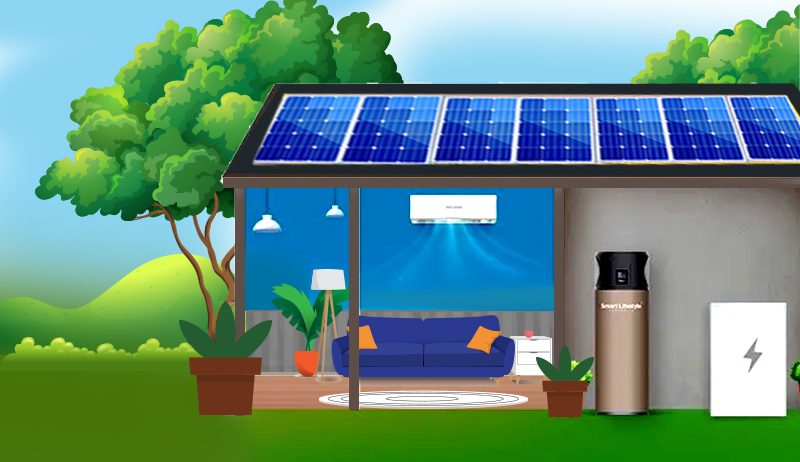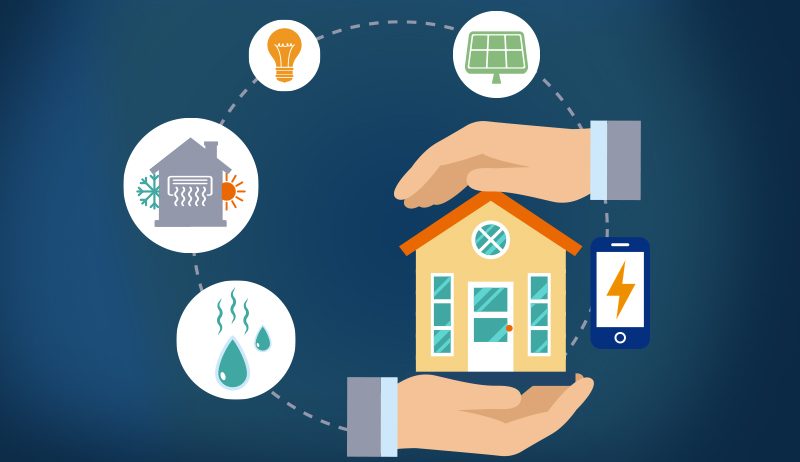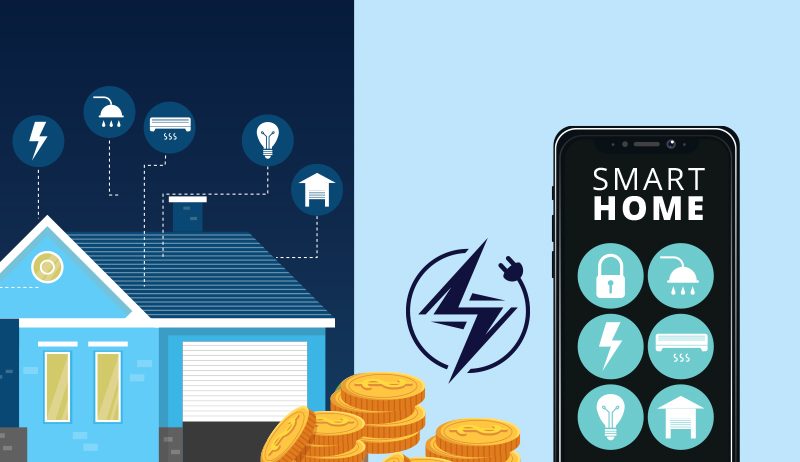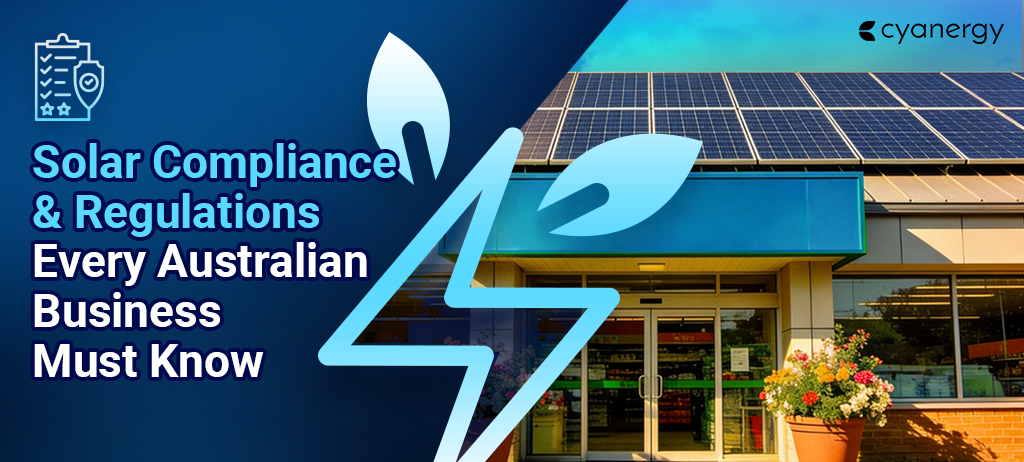As costs are increasing and people become more concerned about controlling the environment, many Australian homeowners want to lower their energy bills and be kinder to the environment.
That being said, how to reduce energy consumption with smart home technologies in 2024?
Besides the clear benefits of a smart home system, there are lots of gadgets and machines that can help you use less energy and spend less money. And like 2024 technology is improving too.
If you get a home automation system in Australia, you can have more power over how much energy you use at home. This way, you can also better manage the money you spend each month on electricity, heating, and water.
How Technology Can be Used to Reduce Energy Consumption?
Technology offers various ways to reduce energy consumption in different sectors. Here are some examples:
Smart Thermostats:
These devices automatically adjust heating and cooling based on your habits and preferences, optimising energy usage.
Energy-Efficient Appliances:
Advanced technologies in appliances, such as refrigerators, washing machines, and LED lighting, consume less energy compared to traditional models.
Lighting automation:
Smart lighting systems allow users to schedule and control lights remotely. LED lighting and automated systems contribute to energy savings.
Home Automation Systems:

Smart home systems allow users to monitor and control energy usage remotely. This includes turning off lights, adjusting thermostats, and managing electronic devices through mobile apps.
Energy-Efficient HVAC Systems:
Heating, ventilation, and air conditioning systems with advanced controls and sensors help maintain optimal temperatures while minimising energy consumption. Consider integrating solar energy with HVAC systems to boost energy efficiency. Click on heat pump and air-con to get the best heating and cooling systems on the market.
Solar Power Integration:
Integrating solar panels and other renewable energy sources into homes and businesses reduces reliance on traditional energy grids. Get a free solar quote from Cyanergy to get the best solar panels at an affordable price.
Smart Grids:
Modernising power grids with smart technologies enables better management of energy distribution, reducing waste and improving overall efficiency.
Energy Storage Solutions:
Solar battery storage and other storage technologies can store excess energy during periods of low demand and release it when demand is high, reducing the need for constant energy production.
Energy-Efficient Building Design:
Employing energy-efficient materials, insulation, and architectural designs can minimise the need for heating, cooling, and lighting in buildings.
Electric Vehicles (EVs):
The shift towards electric vehicles reduces reliance on fossil fuels and contributes to lower overall energy consumption in the transportation sector.
Energy Management Systems (EMS):
Businesses and industries can use EMS to monitor and optimise energy usage, identifying areas for improvement and implementing energy-saving measures.
Smart Meters:
A smart meter or energy monitor provides real-time information on energy consumption, encouraging users to make informed decisions about their energy use.
Integrating these technologies into daily life, individuals, businesses, and governments can contribute to reducing energy consumption and promoting sustainability.
Advantages of Smart Home Tech

Smart home technology offers various advantages that enhance convenience, efficiency, and security for homeowners. Here are some key benefits:
Convenience:
Smart home devices allow for remote control and automation of various functions, such as lighting, thermostats, and security systems, providing convenience and flexibility.
Energy Efficiency:
Smart thermostats, lighting systems, and appliances can be programmed or controlled remotely to optimise energy usage, resulting in lower utility bills and reduced environmental impact. As a result, it promotes energy efficiency.
Security:
Smart home security systems provide real-time monitoring, alerts, and remote access, enhancing the safety of the home. Cameras, doorbell cameras, and smart locks contribute to a more secure living environment.
Energy Monitoring and Management:
Homeowners can monitor and control their smart devices from anywhere with an internet connection. This is particularly useful for checking on the home, adjusting settings, and receiving alerts while away.
Integration and Compatibility:
Many smart home devices are designed to work together seamlessly, creating a cohesive and integrated system. Compatibility with virtual assistants like Amazon Alexa or Google Assistant allows voice control for added convenience.
Customisation:
Smart home technology enables users to customise settings based on personal preferences and routines. This level of personalisation enhances the overall living experience.
Efficient Resource Management:
Smart irrigation systems, water heaters, and appliances help manage resources more efficiently, contributing to water and energy conservation.
Health and Well-being:
Smart devices like air purifiers, thermostats with air quality monitoring, and fitness trackers contribute to a healthier living environment by promoting better indoor air quality and encouraging healthier habits.
Increased Home Value:
The integration of smart home technology can increase the resale value of a property. Many homebuyers appreciate the added features and potential energy savings associated with smart homes.
Cost Savings:
While the initial investment in smart home technology may seem high, the long-term cost savings in energy bills, reduced maintenance, and increased efficiency can outweigh the upfront expenses.
Time Savings:
Automation of routine tasks, such as adjusting thermostats, turning off lights, or managing home security, saves time and allows homeowners to focus on more important aspects of their lives.
Overall, smart home technology enhances the quality of life by providing a more comfortable, secure, and efficient living environment. As technology continues to advance, the potential benefits of smart home tech are likely to grow even further.
But, How Energy Efficient are Smart Homes?

Smart homes can be significantly more energy-efficient compared to traditional homes, primarily due to the automation and optimisation capabilities offered by smart technology.
Smart homes are energy-efficient due to the integration of advanced technologies that optimise resource usage.
For example, smart thermostats enable precise temperature control, adjusting settings based on occupancy and user preferences. And it results in reduced heating and cooling energy consumption.
Automated lighting systems ensure lights are only on when needed, minimising electricity waste. Appliances with energy-saving features, such as smart refrigerators and washing machines, contribute to overall efficiency.
Additionally, the ability to remotely monitor and control devices allows homeowners to make informed decisions about energy usage, leading to further savings.
The seamless integration of smart devices and systems enables a holistic approach to energy management. And eventually, it promotes sustainability and lowers utility costs in modern homes.
While smart homes offer great potential for energy efficiency, the actual impact depends on the user’s behaviour, the selection of devices, and how well these devices are integrated and optimised.
Homeowners must actively use and manage smart technologies to maximise their energy-saving benefits.
Also, the initial cost of implementing smart home technology can be a consideration, but the long-term energy savings and potential environmental benefits often outweigh the upfront investment.
How does Behavioural Awareness Maximise the Energy Efficiency of Smart Homes?
Behavioural awareness plays a crucial role in maximising the energy efficiency of smart homes. Here’s how:
Behavioural awareness involves making users conscious of their energy consumption habits. Smart home systems can provide real-time feedback and insights into energy usage patterns, encouraging users to be more mindful of their behaviours.
Smart home platforms can analyse individual habits and provide personalised recommendations to improve energy efficiency.
For example, suggesting optimal thermostat settings, identifying energy-intensive appliances, or proposing changes to daily routines.
Users can set up automation rules based on their preferences and routines. By understanding their behaviour, smart home systems can automate processes like adjusting thermostat temperatures, turning off lights, or powering down electronics when not in use.
Behavioural awareness can also be enhanced through smart notifications. Homeowners can receive alerts or reminders about energy-saving opportunities, such as turning off lights, adjusting thermostat settings, or switching to energy-efficient modes on appliances.
Some smart home platforms incorporate gamification elements, turning energy-saving activities into a game. Users can earn points or rewards for efficient behaviour, creating a positive reinforcement mechanism that encourages sustainable practices.
Smart home systems often include energy dashboards that display real-time and historical data on energy consumption. Visualising energy usage patterns helps users understand the impact of their behaviour, motivating them to make conscious choices to reduce energy consumption.
Smart home devices equipped with occupancy sensors can detect when rooms are unoccupied. By automatically adjusting lighting, heating, and cooling in response to occupancy, these systems optimize energy usage based on real-time behaviour.
Behavioural awareness extends beyond the home through integration with wearable devices and smartphones. Users can receive alerts and suggestions on energy-saving actions while they are away from home.
Smart home platforms can include educational components to inform users about the energy-efficient features of their devices. Training programs or tutorials can empower users to maximise the benefits of their smart home technology.
By combining technological capabilities with behavioural insights, smart homes can empower users to make informed decisions that lead to more sustainable and energy-efficient lifestyles.
Increased awareness and engagement foster a sense of responsibility and contribute to the overall success of energy-saving initiatives in smart homes.






